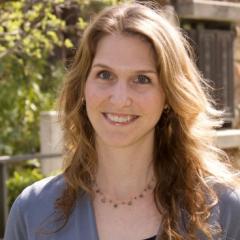
Volunteer of the Month: Cantor Lauren Bandman
Lauren is a 2006 graduate of HUC-JIR, DFSSM. She is the Cantor at Congregation Beth Am in Los Altos Hills, California.
In what capacity have you volunteered for the ACC?
My first ACC committee work was on the San Francisco convention. Most recently, I was co-chair of the Israel convention, along with David Berger. I was also part of the delegation that went to Rome and to present a concert of Jewish music at the Vatican. In addition to being a member of our choir at that amazing event, I had the honor of introducing our concert in Italian, conducting a piece and being a soloist. Over the years, at conventions, I have participated in concerts, led tefilah, facilitated workshops and panel discussions. I am a proud member of the Bay Area Cantors chevruta. We get together and sing at each other’s concerts, do benefit events for organizations such as the Bay Area Healing Center, and URJ Camperships. We’ve also raised money for the HUC-JIR DFSSM Certification Program.
How did you get involved in volunteering? Did someone approach you?
For some of the work, I volunteered. For other aspects, I was approached by colleagues. Claire Franco invited me to co-chair the Israel Convention. David Margules asked me to help with fundraising for the Bay Area Healing Center. Bruce Ruben requested that our Bay Area group participate in a concert to help raise money for the Certification Program.
3. What has been the most rewarding for you as a volunteer?
I love working with our colleagues and doing anything I can to help forward the Reform Cantorate; to strengthen our organization and our movement. It was amazing to work on the Israel Convention; to plan with David, Rachel and many others who made the dream a reality. Seeing it all unfold and experiencing with our colleagues the programming we envisioned was such a joy.
What do you see as the biggest challenge facing the cantorate today and looking into the future?
Our biggest challenge is the same challenge that we are facing as a whole movement: helping our community understand what the Reform synagogue can bring to the community - helping our community understand that we need each other. Jews need synagogues and synagogues need Jews. It is also important for our organization to grow with the times, to be able to adapt and adjust. We are responsible for maintaining our link to tradition and guarding it as we move into the future.
Why did you become a Cantor? What or who influenced you?
I became a cantor because the role of a cantor weaves together so many of my passions and interests: teaching, learning, community, singing, music, pastoral counseling, musical direction and conducting. Unfortunately, I did not have any cantorial role models growing up, and thus came to discover the possibility of being a cantor a little later than some. I had support from my congregational rabbi, who was my best friend’s stepfather. When I told him I was considering the cantorate, he was quite enthusiastic. That was significant for me. My college Hillel rabbi was also incredibly supportive and encouraging. However, the first person who asked me if I had ever considered becoming a cantor was my non-Jewish voice teacher from Tennessee at The Ohio State University, where I was studying music education. She often sang in professional synagogue quartets. She knew that part of Jewish life much better than I did, and recognized a potentially good match. I will always be grateful to her.
Tell us something about yourself that we might not know, but that you’d like to share with us.
Those who went to Rome, and some other colleagues, may know that I am an Italophile. I love all things Italian: culture, music, language, art, and cuisine. In high school I was a serious clarinetist. I was 1st chair in our high school band and orchestra, as well as first chair of our regional symphony youth orchestra. At that point in my life, my plan was to become an orchestra conductor. I wanted to be the next Keith Lockhart, conductor of the Boston Pops.

